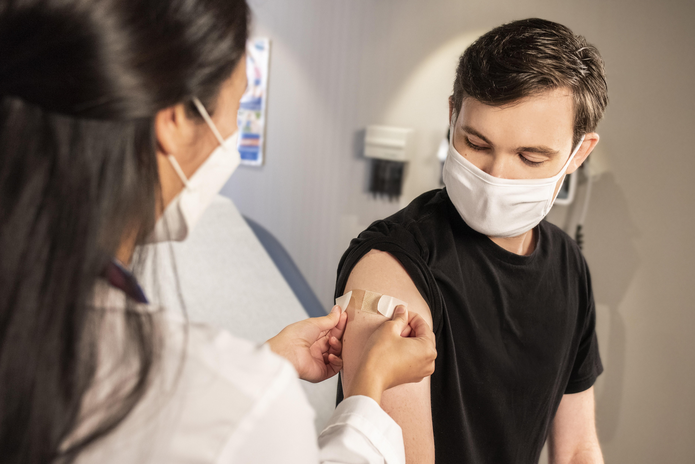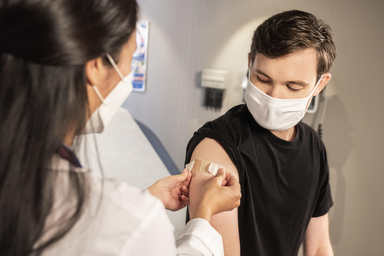With the CDC having recently expanded eligibility for COVID-19 Booster shots, it’s important that we educate ourselves on why we should be getting them and what it entails. There’s a huge amount of information available online regarding these shots, both the original and the booster version of the vaccine but I thought I would give the Sparknotes version here.
According to the CDC, the people currently eligible and suggested to go in and get stuck with this magical COVID-defying needle are those 65 or older, 18+ who live in long-term care settings, 18+ who have underlying medical conditions, and 18+ who work or live in high-risk settings. It makes sense as to why these populations should get the booster, as we definitely want to avoid another breakout of this particularly nasty disease that had plagued the world for the past couple of years. So, if you happen to be part of one of these mentioned populations, schedule your COVID vaccine ASAP. Appointments are available for free at a variety of places including Rite Aid, Kroger, Walgreens and CVS.
According to the CDC, “vaccination remains the best way to protect yourself and reduce the spread of the virus and help prevent new variants from emerging” (2021). This means that whether it be Moderna, Pfizer or J&J, those who are vaccinated have a much lower chance of both contracting and spreading the disease. Not only that, but if they do manage to catch it, the symptoms are very unlikely to be life-threatening and commonly present themselves in much more manageable and less dangerous ways.
Due to this, being vaccinated is not only advantageous to yourself and your personal health but also works towards protecting the rest of the populace, especially those whose well-being would be very at risk if they were to contract COVID. Some people have prior health conditions that actually prevent them from getting the vaccine in the first place, although I’m sure the majority of them would if their bodies didn’t quite literally not allow it. So, if those who are physically able to get the vaccine do so, it also protects the health of those are are not.
According to Dr. Walensky, “evidence shows that all three COVID-19 vaccines authorized in the United States are safe – as demonstrated by the over 400 million vaccine doses already given. And, they are all highly effective in reducing the risk of severe disease, hospitalization and death, even in the midst of the widely circulating Delta variant.” While COVID cases had been steadily declining since January of 2021, the CDC saw a rapid and, quite frankly, terrifying rise in cases and hospitalization across the country.
This was shown to be largely attributable to the new Delta variant, a more infectious version of COVID that had increased transmissibility in comparison to other variants (2 times as transmissible to be exact). This was even the case for some vaccinated individuals, meaning that further measures were sought after. And even though it was technically still possible for vaccinated individuals to spread the Delta variant, they were also shown to do so for a much shorter period of time than those who hadn’t received any of the three vaccines.
So what is the difference between the original COVID-19 vaccine and the booster shot? Well, without getting into the science of it (because it’s doubtful a Sparknotes version of anything would include that level of detail), the booster shot is simply an updated continuation of the vaccine. Booster shots are actually the same formulation as the previously existing vaccines. However, the Moderna booster shot is half the dose of the version that people were given originally.
This is simply because our bodies have already received and been introduced to the vaccine and partial version of the virus. The third shot, as the name suggests, is simply a “boost” for what our bodies have already been given. Getting it will provide an additional layer of protection against COVID and continues to further protect those who are at high risk for infection and/or resulting health problems. I
I would argue that no matter how many metaphorical layers of armor we have against the virus, adding another one wouldn’t hurt, as I doubt anyone wants to go back to the intense level of isolation we had to practice before. And although I did just say it “wouldn’t hurt,” it is common to experience some unpleasant side effects after receiving the third dose. Going along with how the makeup of the booster is technically the same as the originals, the less-than-ideal feelings following the shot are as well.
The booster shots should be given six months after the second dose (or first, in the case of J&J) and as painful as it might be for the following day, I guarantee those side effects are much less painful than contracting or spreading the actual disease itself. If you are eligible for getting the booster shot at this point, I highly recommend scheduling an appointment ASAP. The websites for doing so are conveniently linked above in the first paragraph.
Even if it isn’t necessarily fun, let’s all band together in our joint horror of having to stay inside all the time and fear passing other people on the street and get vaccinated. Whether it be your first, second, or third dose, it will always make a difference. According to Our World in Data, 64 percent of people are vaccinated in Virginia and a slightly less than stellar 58.7 percent of people are within the United States. As much as I’m not a math person, I can tell using my limited high school algebra knowledge that those numbers are certainly not as high as they could be.
I doubt this article will necessarily make a huge difference in that regard but I do hope it makes it easy for at least one person to schedule their third appointment. As scary as booster shots (and vaccines in general) can be, that one day of discomfort is so worth the world being able to move past our most recent and favored pandemic.




